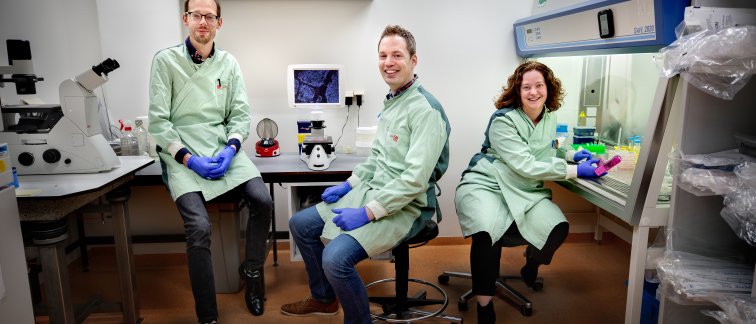Inherited cardiomyopathies affect tens of thousands of people in the Netherlands and cause severe symptoms and an increased risk of sudden cardiac death. In Amsterdam UMC researchers, clinicians and nurses team up in (inter)national studies to increase our understanding of genetic heart diseases, and apply new insights in clinical practice, and thereby provide the best care to our patients.
About
Amsterdam UMC provides a unique setting for translational research aimed to improve diagnostics and treatment of patients with a genetic cardiac disorder. Our center enables tight collaboration between clinicians and basic scientists, and research rests on a broad base of expertise in clinical cardiology, transcriptional regulation, RNA biology, clinical and experimental electrophysiology, cardiomyocyte and sarcomere physiology, metabolism, genetics, developmental biology, epidemiology and bioinformatics. Several of the principal investigators are at the forefront of their respective field. In depth genetic and cardiac phenotyping of patients is ensured by advanced expertise present at the Cardiology, Clinical Genetics, and Radiology/Nuclear Imaging departments of Amsterdam UMC. State-of-the-art technological platforms and large cohorts of highly characterized patients with inherited cardiac conditions have been assembled over the last 20 years. Using a broad range of technologies, including animal-free models, the overall aim is to develop personalized treatment for patients at all ages.
Meet our expert teams
Genetics to guide personalized medicine
The Amsterdam UMC team has a leading international position in the discovery of genetic risk factors in the patient cohorts, and conducts functional genomics studies to decipher the impact of genetic risk factors on gene regulation and disease development.
Personalized advice on sports activities
Scientific research on cardiovascular effects of exercise has brought relevant insights for personalized advice on sports activities, not only for patients with a genetic heart disease, but also for athletes and more recently individuals infected with SARS.
Strength of physiology to study disease mechanisms in human heart models
At its most basal level, the function of the heart is to contract to eject blood and to relax to allow filling for the subsequent contraction. At the cardiomyocyte level contractility is tightly controlled by a process called excitation-contraction coupling. The expertise at the departments of Experimental Cardiology and Physiology is performing andintegratinghigh quality measurements of ion channels, membrane potential, calcium release and reuptake and contraction and relaxation. We perform these measurements in the context of hypertrophic, dilated and primary arrhythmias syndromes, using a combination of human tissue, animal models and human induced pluripotent stem cell derived cardiomyocytes. By developing and optimizing throughput of measurements, we are now also able to screen compounds, to speed up the therapeutic potential of our findings.
Translational research in hypertrophic cardiomyopathy
The combination of patient data with experimental data collected in state-of-the-art human disease models enables to uncover cellular pathomechanisms of hypertrophic cardiomyopathy. The combination of clinical, cardiac imaging and experimental data is needed to improve risk prediction and person-specific treatments.
Personalized medicine in aortic pathology
We bring together clinical and experimental data to develop novel approaches that address clinical needs in human aortic research and surgical intervention. With translational research, we aim to uncover the underlying pathophysiology and pathobiology of aortic aneurysm and dissection formation in patients, and use this model to develop personalized therapies targeting thoracic aortopathy and prevent disease progression.
Precision medicine for muscle disorders
Gene defects often do not only affect the heart, but also skeletal muscle. Joint expertise in both cardiac and skeletal muscle physiology provides a unique setting to advance research on new drug targets. Scientists frequently meet with patients. Everyone is welcome to visit our laboraties to learn more about our projects and provide input.
Our network
We team up with national and international partners in building patient registers that are key for improvement of treatment guidelines, and together with patient representatives communicate about recent advances in diagnostics and therapies.
More information can be found at:
- https://dcvalliance.nl/predict-2
- https://dcvalliance.nl/arena-prime
- https://dcvalliance.nl/our-consortia/double-dose
- https://cardiomyopathie-onderzoek.nl/
- https://www.erfelijkehartziekten.nl/
- https://www.hdmt.technology/
- https://vu.nl/en/research/more-about/transition-animal-free-innovations
National
- https://guardheart.ern-net.eu/
- https://www.fondationleducq.org/network/cytoskeletal-regulation-of-cardiomyocyte-homeostasis-in-health-and-disease/
- https://www.fondationleducq.org/network/the-sodium-channel-as-a-therapeutic-target-for-prevention-of-lethal-cardiac-arrhythmias/
International

